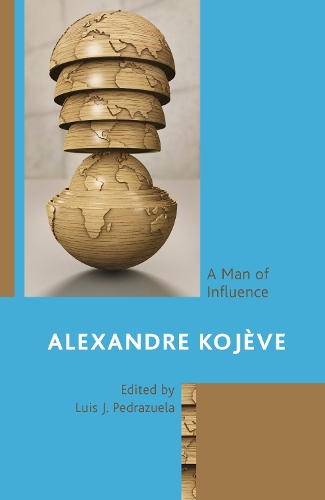
Alexandre Kojve: A Man of Influence
(Hardback)
Publishing Details
Alexandre Kojve: A Man of Influence
By (Author) Luis J. Pedrazuela
Contributions by Jos Mara Carabante
Contributions by Bryan-Paul Frost
Contributions by Isabel Jacobs
Contributions by Jeff Love
Contributions by Waller R. Newell
Contributions by Massimo Palma
Contributions by Luis J. Pedrazuela
Contributions by Jos Daniel Parra
Contributions by Alexei Rutkevich
Bloomsbury Publishing PLC
Lexington Books
23rd September 2022
United States
Classifications
Professional and Scholarly
Non Fiction
Social and political philosophy
Politics and government
194
Physical Properties
Hardback
260
Width 159mm, Height 238mm, Spine 25mm
576g
Description
This edited volume addresses Alexandre Kojve's work from different perspectives, emphasizing the continuity between his early reception of a set of non-philosophical and philosophical influences and that which he might have sought himself to exercise in a pedagogical and practical manner. The first part of the book comprises six essays in which their authors explore Kojve's understanding of art, religion and atheism, and his reception of the thought of Hegel, Marx, and Carl Schmitt. The book's second part is made up by two contributions that tackle respectively Kojve's conceptions of the end of history and empire in the light of his notion of Sophia or Wisdom, and his understanding of the relationship between philosophy and power in the light of an exegetical reading of the debate he held with Leo Strauss. The authors of the final three essays set out to explore the extent to which Kojve's previous processing of a set of non-philosophical and philosophical influences might have resulted in three increasingly concrete outcomes, namely: his notion of authority; the Lacanian mirror-stage; and global trade.
Reviews
This is a stimulating collection that sheds new light on Kojves thought and activity. The contributions do justice to the remarkable range and continued relevance of the enigmatic figure.
-- Svetozar Minkov, Roosevelt UniversityThis is a wide-ranging, informative, and provocative collection of essays, well organized and integrated so as to shed much needed light on the thought of the greatest Hegelian of the twentieth century.
-- Thomas L. Pangle, University of Texas at AustinAlexandre Kojve is well known for having introduced a whole generation of French philosophers to an existentialist version of Hegels system. One of the great merits of the collection of essays gathered by Luis J. Pedrazuela is to highlight the breadth of Kojves work besides his lectures on Hegels Phenomenology of Spirit. The contributions to this collective book draw attention to other important writings by Kojve such as his Notion of Authority and his Outline of a Phenomenology of Right. They enrich our understanding of the philosophical Twentieth Century by placing these works in the context of Kojves exchanges and correspondence with some of his contemporaries, particularly Leo Strauss and Carl Schmitt.
-- Vincent Descombes, cole des Hautes tudes en Sciences Sociales, ParisThese articles on Alexandre Kojve range from the relation of his thought to other thinkers (Hegel, Marx, Strauss, Schmitt, Lacan) to his understanding of the deepest roots of political life (authority, and right or justice); from his practical concerns with economic issues whose resolution could help lead (via European integration) in the direction of a peaceful global order to the character of art toward the end of its historical development. The collection testifies to scholars ongoing fruitful fascination with this brilliant, paradoxical, and profound philosopher.
-- James H. Nichols Jr., Claremont McKenna CollegeAuthor Bio
Luis J. Pedrazuela is currently a research fellow at the University of Leeds.
